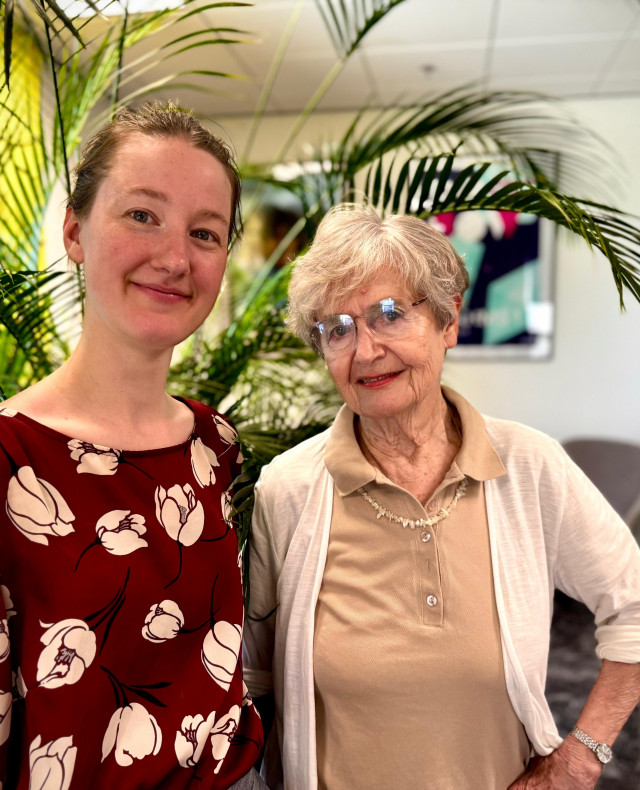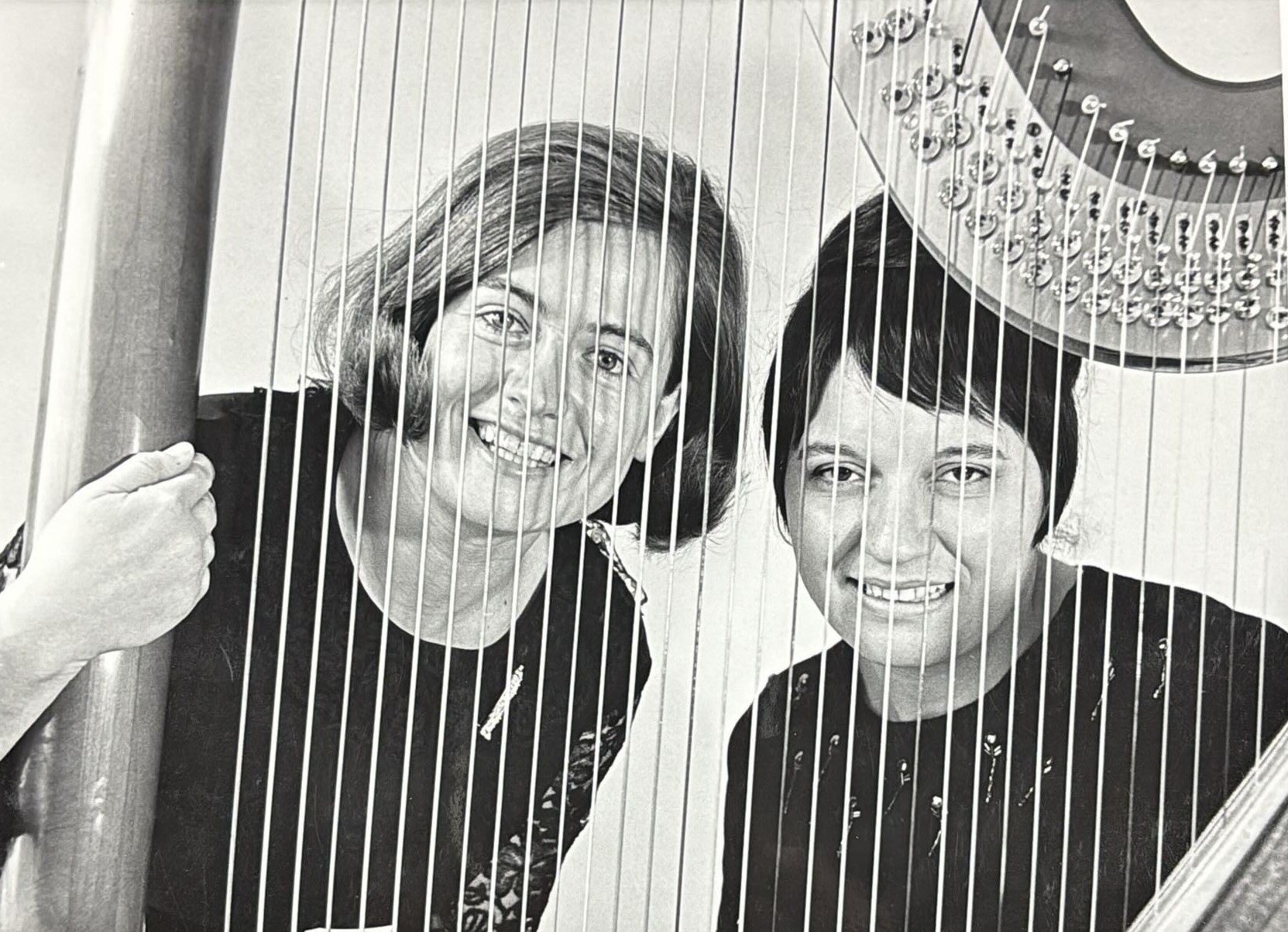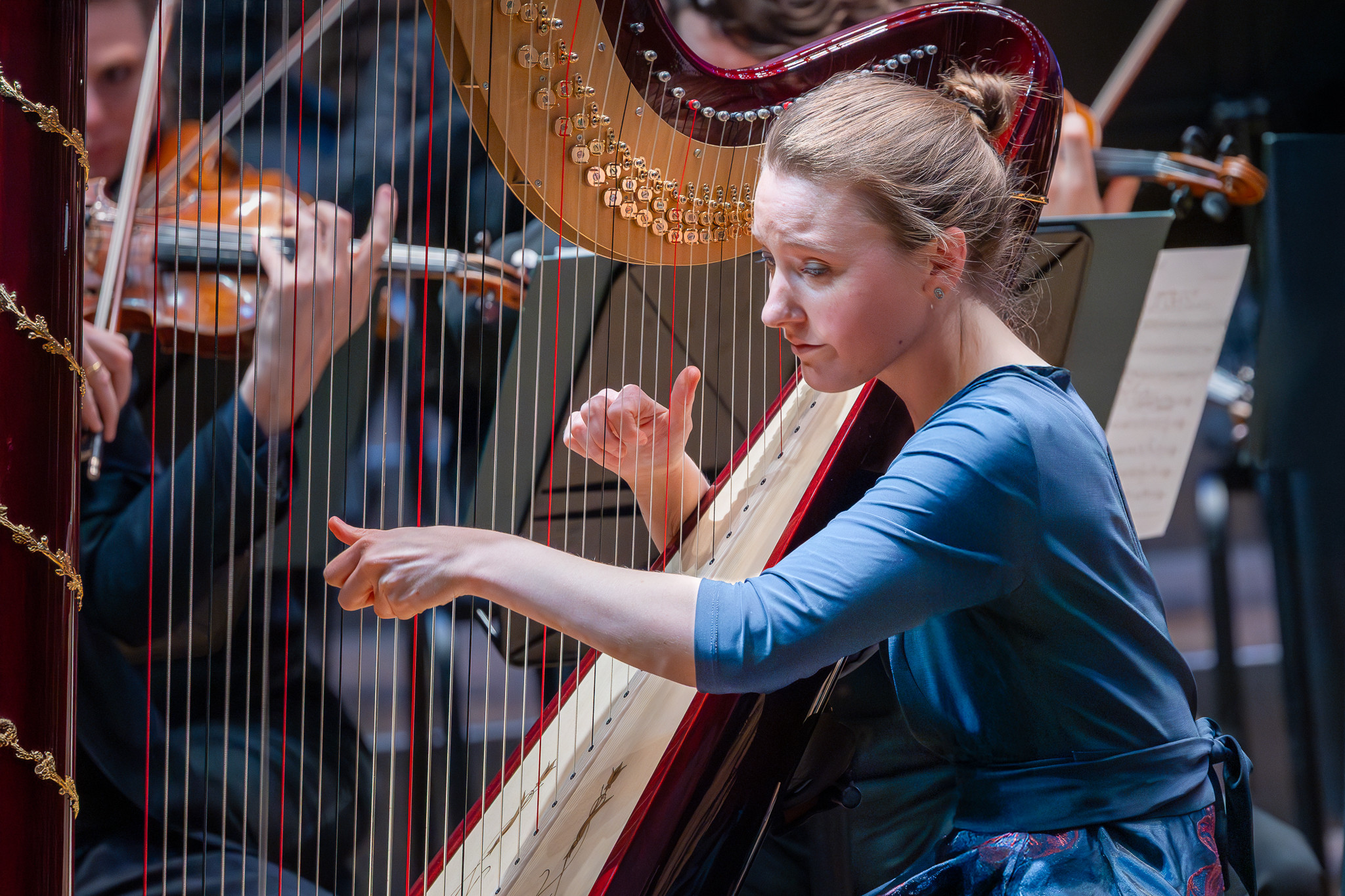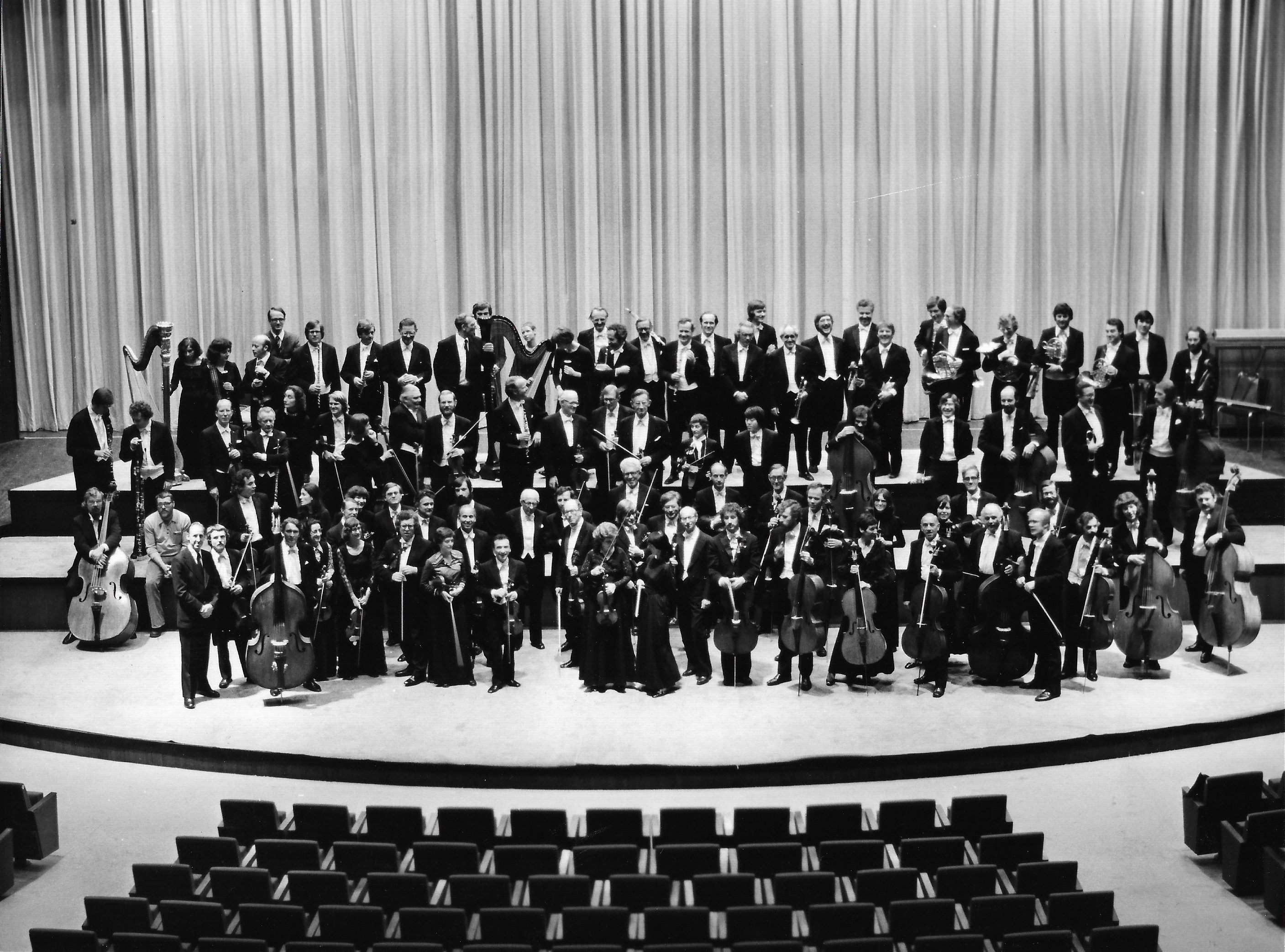Štefica Žužek & Mathilde Wauters
In conversation with two generations of Residentie Orkest harpists

Playing the harp in an orchestra: a versatile but also demanding task. Mathilde Wauters and Štefica Žužek know all about it. Whereas Wauters has been the Residentie Orkest 's current harpist since 2022, former harpist Žužek took early retirement in 2000 after 34 years. In a double interview, they reflect on their love for the harp as well as the orchestra.
"Playing the harp in an orchestra is quite an art," explains former harpist Štefica Žužek (85). Mathilde Wauters (29) nods, "As a harp, you are on your own, some pieces you don't play and above all you have a very changing function. You can be rhythmic, help determine the color, accompany and occasionally you have a solo. You don't have a fixed role, sometimes you belong to that and sometimes you belong to that..." Žužek agrees nodding. There's more than half a century in age between the two women, but it doesn't show during the conversation: their passion for the harp and the (former) role as harpist with the Residentie Orkest that they share immediately connects. They know better than anyone what the other is going through as a harpist, a position that, they both say, is quite unique in the orchestra.
"I sat on my sister's lap when I played harp for the first time and immediately felt: this is for me."
- Mathilde Wauters
Love for the harp
"From the age of seven I played the piano," Žužek says, asked about the origins of her love for the harp. "But my hands didn't grow well enough for the level of the piano. In Ljubljana, Slovenia, where I'm from, someone had just started giving harp lessons. My piano teacher asked: isn't that something for you? You don't need big hands for that. During the first lesson, the teacher bribed me with chocolates. But that was not necessary: because of my experience with piano, I learned very quickly and fell in love. A difficult love, I always call it." She says it with a smile. At the time, small harps didn't exist, so Žužek started right away on a concert harp at age 11.
Wauters began playing the harp a little earlier, at age five. In doing so, she was inspired by one of her sisters. "I have four older sisters who all play an instrument. My parents are also professional musicians. One of my sisters played the harp: she had one of those children's harps, a Celtic model. I sat on her lap when I played the harp for the first time and immediately felt: this is for me. At first my sisters said: we should all do another instrument, maybe guitar is something for you? But by then my sister had already taught me to play a little and I was sold. In the end, they were okay with me playing the harp too," she says with a laugh. "Together with my sister we now sometimes play concerts."
Shaping influences
In their development as harpists, Žužek and Wauters have been influenced by a rich collection of mentors, musical pieces, composers, conductors... Also, the atmosphere you can create with a harp was itself one of the biggest inspirations for Žužek. In addition, her former Slovenian teacher has been very formative. "She herself studied with the famous Italian harpist of the last century, Clelia Gatti Aldrovandi. We talked more about the content and sound of the music than the technique. That attracted me tremendously. I have always considered myself a musician and only secondarily a harpist: I make music, coincidentally on the harp. Later I learned an enormous amount from Phia Berghout. She brought different international harpists together during meetings so we could learn from each other. Very stimulating." Wauters can talk about it. "All the people I ever had lessons from were very important at that time," she says. "From one I learned the basics, from another the energy, then another teacher was fantastic in terms of content. I also studied with Isabelle Moretti for a while; with her, technique always serves the sound. She always explained very well what she was looking for. That helped me a lot. And the orchestra academy was very formative for me, that pushed me towards the orchestra." In her time that did not exist, Žužek says; she had to learn how to play in an orchestra by trial and error. "At the conservatory is Slovenia we didn't have an orchestra. From the first time I joined the orchestra, the Radio Symphony Orchestra Ljubljana, I really had to learn to listen: how do the horns fall in? How to breathe with the others? Then when the conductor said, "Harp, not good!" I could sink through the floor. Those first months were terrible for me..."
Path to the Residentie Orkest
Despite the fact that both of them found playing in an orchestra uncomfortable at first, they ended up with one - the Residentie Orkest. Žužek's path to the Hague orchestra was winding. "In Slovenia I finished my studies at the conservatory in the early 1960s. I did another kind of master's, got a 'post diploma' written on a piece of paper. That additional training was still being developed then. During the Last years of my studies, I went twice to Phia Berghout's International Harp Weeks. At the Limburg Symphony Orchestra they were looking for a harpist in 1964. Chief conductor André Rieu Sr. knew me from the harp weeks and I was allowed to start immediately. An additional advantage was that I could also study with Phia Berghout, then a teacher at the Maastricht conservatory. In early 1966 the then harpist of the Residentie Orkest died and a spot became vacant in the middle of the season. Phia said, "You have to get as much experience as possible, so go play trial! I did and ... I won. At the same time, I was thinking about returning to Slovenia. I loved my country, went into the mountains all summers. In the post office, I called my father. He said, "Don't be afraid, just do it, there are trains." After the trial play, Van Otterloo said, "You have to stay for at least five years and not have a fear of flying, we're going to America on tour for six weeks next year. Wow! Then I immediately said 'yes', of course." Wauters laughs: she can imagine, that that prospect won Žužek over. She herself has been playing with the orchestra for three years now. "Through a trial play I ended up here," she says. "In Belgium, the Residentie Orkest has a reputation as a very good orchestra. It is less in the news than the other two big orchestras, but there is a lot of quality. The old recordings with Van Otterloo and others are also very well known."

"One concert that really sticks with me: with Van Otterloo we performed at Carnegie Hall, we did a performance of Ravel's Daphnis et Chloé. Ravel and Debussy were Van Otterloo's strengths, which was amazing. It still gives me goosebumps!"
- Štefica Žužek
Inspired and attentive orchestra
The Residentie Orkest has won their hearts. They both agree that the orchestra's outstanding musicality goes hand-in-hand with a remarkably fine atmosphere among the musicians. Žužek does have an anecdote about it: "For a while I didn't get along very well with a colleague and the Concertgebouw was looking for a second harp. But then someone said to me: don't, no orchestra is as nice as the Residentie Orkest, you just have to get along with that colleague. And so it is: in addition to sociability, they have a kind of enthusiasm as a group." Mathilde nods in agreement. "Yes, indeed: there is a real desire to make music together. Everyone just really wants it. And the musicians are very attentive to each other: are you all right? There is no elbowing. Besides, as a harp you have a bit of a special position: you are alone and often you are not there. Sometimes you have to say on your own to a group of wind players: but my part is important too! But with this orchestra I don't have to do that."
And it is also an activist orchestra, Žužek wants to add. She remembers well how the musicians themselves "helped build" the Dr. Anton Philipszaal, which was the orchestra's home from 1987 to 2015. "There was little budget then and we had to raise money ourselves. I went around my neighborhood with home-baked cakes: does anyone want to contribute anything? With also the help of some businesses, we were able to stay in existence. Because of all that effort, we really loved that hall. But the difficulties were not over then: in 1998 there was talk for a while that we would have to merge with the Rotterdam Philharmonic Orchestra. Then the political climate changed: subsidies for classical music were cut. We gave protest concerts and took action. That fighting spirit really characterizes this orchestra."

On tour in the Eastern Bloc
Tours and concerts are not infrequently important highlights in a musician's life - so too in that of Žužek and Wauters. When Žužek was still a harpist with the orchestra, the musicians did go on tour every year. She praises the "human aspect" of it: tours, she says, are like cement for an orchestra. Some are still vividly in her mind. "I remember a tour to Prague, conducted by Ferdinand Leitner - at that time we did several tours of the Eastern Bloc. Because we had been stopped at the border for a very long time, we arrived late for our concert. It was supposed to start at 8 p.m., but we didn't get there until 8:30. It was completely sold out. What were we supposed to do? The management said: we will explain to the audience what happened, you go straight into the hall. The instruments were already ready. Later it appeared in the newspaper: the Residentie Orkest has it so high up, the musicians don't even bother to appear on stage in decent clothes. It was a political game, that contrast between East and West was emphasized quite a bit. That really impressed me. And a concert that still really sticks with me: with Van Otterloo we performed at Carnegie Hall, we did a performance of Ravel's Daphnis et Chloé. Ravel and Debussy were Van Otterloo's strengths, which was amazing. It still gives me goosebumps!"
Wauters also can't wait to experience more tours. So far she has only experienced one, to Salzburg. "You do indeed deal with your colleagues in a different way for a while, which is nice. And it is interesting to play in a different hall: you are forced to listen to each other more attentively. As for concerts that have stayed with me: in my probationary year I played Mahler 9, that symphony is so special."

No life without music
Looking back on her decades-long career with the Residentie Orkest, Žužek concludes that the political climate has changed for the worse but the quality of the orchestra has only improved. "The level now is technically much higher. When I joined the orchestra, there were some super gifted musicians, but with a less developed technical base. That was due to various things like war or because they couldn't afford it - conditions were different then than today. But now ... everyone is so perfectly technical in addition to their musicality. The Residentie Orkest is a tremendously inspired and musical orchestra." Wauters nods; she is very happy with how she is doing with the orchestra and hopes it may continue that way. Žužek wishes her many more happy years with the orchestra, as she herself has had. "I was very happy here; looking back I can say that I was really blessed to live in such a fine music environment and enjoy it so much.
After I retired, I even found it very difficult to attend concerts for a while; I missed playing too much. It felt: I belong there too, on stage! But fortunately I could quickly overcome that year. I still feel very connected to 'my' orchestra. No life without music."
Grete Simkuté